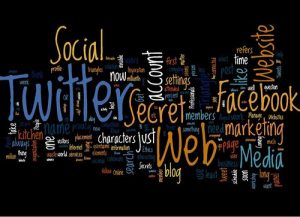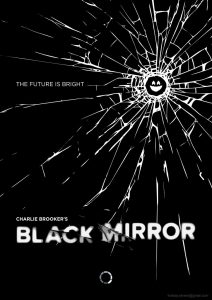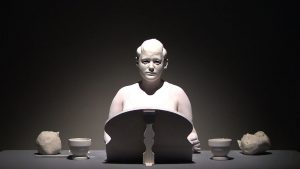
<Black Mirror>, a British channel 4 miniseries that began to air in December 2011, is once again a global hit after <Sherlock>. Its exquisite narrative structure, dense satire and humor, and sharp criticism of reality make it stand out from “TV Show”, a popular cultural form full of conventions and stereotypes, and quickly become one of the hot topics on social networks.

< Black Mirror> is a very expressive representation of the current reality, that is, after the digital transformation, media is playing an increasingly important role in social life, which not only refers to its contribution to the growth and dissemination of information, As well as its role in some social and political events, such as the Color revolution in the Middle East, it also refers to the fact that media has fully penetrated into the public’s daily life, and even almost completely rewrote the public’s perception and cognitive way. Set in the near future, <Black Mirror> sets many deduced or distorted realistic situations in the way of science fiction or dystopian imagination, and blends absurdity and strangeness into these familiar scenes in a series of dramatic conflicts. Perhaps there is a point worth further discussion: from what standpoint does <Black Mirror> criticize the media? Furthermore, what kind of understanding of the Internet is presented in this TV series and television work?
The Relationship between Media and Power
Those who are familiar with British TV dramas or movies can probably tell the Difference between Black Mirror and Sense and Sensibility (2008), Sherlock (2010).

In fact, this difference is mainly reflected in the five most basic British TV channels, they have a clear division of labor and a wide coverage. Channel 4 was set up in 1982 as an extension of ITV, catering to demands not covered by other broadcasters, especially young people. Channel 4, though a public channel, does not make money from ratings but is self-financing. This commercial nature makes it more explicitly audience-friendly, entertaining and time-sensitive, and therefore more sensitive to market trends. For example, <The IT Crowd> and <Dead Set> tend to use humor and irony to deal with sensitive realistic problems. In addition, it is worth mentioning that <Big Brother>, broadcast in 2000 as a game reality show, has become the pillar of Channel 4 for a long period of time, with high ratings and advertising revenue. This show which originated in the Netherlands and has since spread to other parts of Europe and the US, is named after George Orwell’s famous 1948 dystopian novel <1984>;”, the latter constructs a centralized society under the rule of “Big Brother”, and everyone is exposed to the eyes of the “Big Brother”. This reality show borrowed this setting, in a closed house full of cameras, filming the contestants’ all-round, full-time life. Contestants compete for fans by performing themselves or competing with others. Every once in a while, some people will be eliminated, and those who stay can get a big prize, this brings to mind the recent popular series: <Squid Game>. Paradoxically, the <Big Brother> reality show has actually flipped<1984>, In this program, people who being watched gain power by “being spied on”, they are no longer victims of rights without freedom.
Invisible Prison: The legal peek into high-tech everyday life
In contrast, the memory “grain” mentioned in the first season of the <Black Mirror> (2011) is a device that can store the memory, which is implanted in the ear and connected to the optic nerve called “grain”. People can project the content of the memory on any screen for them to share with others. Ostensibly a perfect and low-cost personal history archive program, however in essence it is closer to a collective peeping image gallery. Due to the high visibility and openness of archives, the privacy rights of archives themselves will no longer exist, and personal behavior must strictly abide by social norms before it can become a standard archive to be recognized by the system, thus being defined as a qualified social person.

The “grain” also plays a powerful role in social monitoring. The digital society is like a precise computer that drives everyone to run in an orderly way, but all this comes at the cost of personal privacy and freedom. The husband is a sensitive and suspicious man, he always suspected his wife cheating, so he kept replaying past scenes through the “grain” for clues, and finally discovered that his wife had drunk sex with someone. Ben’s wife, who loves her husband deeply, runs away from home due to humiliation, and the husband can only feel the warmth of the family again with “grain”. IN the face of great pain and despair, he cut open his ear behind with a razor blade and took out the “grain” with his own hands. There is no democratic pleasure in voyeurism in this episode, and the husband’s actions are no doubt a symbol of terrible moral judgment. Is it fair for the wife to be punished like this? Was the husband’s action infallible? What is important is that the media’s voyeurism of society makes society visible and safe, but in fact technology itself increases the risk of life. The imagined technology on display in black Mirror is not that far away, and Google Glass could be a good example. Will humanity be able to see beyond the seduction of these technologies to see its future destiny? A Mirror report said that chatbots in <Black Mirror> would be a reality, and Microsoft even obtained a patent allowing them to make chatbots using the deceased’s personal information. The patent suggests that Microsoft will use more personal information like images, voice data, social media, and electronic information to create real representations of their personalities (Bett, 2021).

Anthony Giddens once said in the <Runaway World> that the risks in modern society are more from human beings, which refers to the risks caused by the influence of continuously developing knowledge of human beings on the world and the risks caused by human beings without historical experience (1999). <Black Mirror> clearly expresses concern about the risks of this duality in the series.
“Mirror World” in the Digital Age
Media and communication policies are at the heart of many social and political issues facing society today (Picard, 2017). The advent of the digital age has brought huge and rapid changes to society. When people analyze the differences between the images taken by the mobile phones of the Iranian green revolution and the images left by the Islamic Revolution in 1979, and then discuss the Internet democracy, they can realize the changes.

At the same time, the combined power of Facebook and Twitter has led some to talk about the possibility of new political fields or new forms of democracy. Of course, there are those who share black Mirror’s skepticism or opposing views. <Black Mirror> clearly does not trust the “mirror world” after the digital transformation. In its criticism, Black Mirror chooses humanism as the foundation to reproduce the society of the “Black Mirror” era with “unreal” and “inhuman “. It should be noted, however, that this critical path actually closes off another “post-human” discussion context. Katherine Hayles in <How We Became Posthuman> (2010), she pointed out that the most fatal thing is not post-human itself. Instead of focusing on and worrying about whether human beings are ended by post-human, it is better to reflect on the constructiveness of human concepts and the class nature contained therein. This is precisely the tension with the <Black Mirror> view.

In conclusion, such optimistic tone can hardly dilute the pessimism of black mirror reflection. In fact, post-human challenges are by no means limited to black Mirror humanism. Media violence has transformed and reshaped social forms and lives at different levels, and the world of cyberpunk is not far away. However, do we really pursue such a developed and prosperous society? “Can post-man provide a new subject to counter capitalism, or is it simply a body that is thoroughly controlled by capitalism? These are perhaps the more pressing questions that need to be answered.

This work is licensed under a Creative Commons Attribution 4.0 International License.
References
Armstrong, J. (2011, December 18). “Black mirror” the entire history of you. IMDb. Retrieved October 13, 2021, from https://www.imdb.com/title/tt2089050/.
Bett, J. (2021, July 7). Sci-fi becomes reality as humans live on as Chatbots – just like Black Mirror. mirror. Retrieved October 13, 2021, from https://www.mirror.co.uk/news/weird-news/sci-fi-becomes-reality-humans-24478249.
Giddens, A. (1999). Runaway World. Profile.
Hayles, N. K. (2010). How we became posthuman: Virtual bodies in cybernetics, literature and Informatics. Univ. of Chicago Press.
Picard, R. G. (2017). Essential principles for contemporary media and communications policymaking. Reuters Institute for the Study of Journalism. Retrieved October 13, 2021, from https://reutersinstitute.politics.ox.ac.uk/our-research/essential-principles-contemporary-media-and-communications-policymaking.